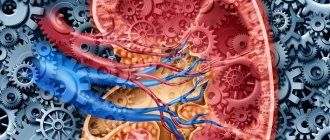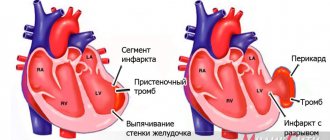Central nervous system degeneration is irreversible organic and functional changes in the spinal cord and brain that lead to mental degeneration. There are many types of diseases, the consequences of which are disturbances in the functioning of the nervous system. Accordingly, treatment will depend on the type of disease and the causes that cause it. Unfortunately, not all diseases of the central nervous system are treatable. Successful therapy for degenerative diseases of the central nervous system is performed at the Yusupov Hospital.
Degenerative diseases of the central nervous system: general concepts
The main characteristics of the group of degenerative diseases of the central nervous system are the following criteria:
- diseases begin unnoticed; before their appearance, the nervous system could function absolutely normally;
- diseases have a gradually progressive course and can last for years or decades;
- some degenerative diseases are associated with hereditary factors and develop in several members of the same family;
- a neurodegenerative disease of the central nervous system is characterized by the gradual death of neurons and their replacement by glial elements;
- atrophic processes at the initial stage of pathology development occur in a specific area of one of the cerebral hemispheres; further, during the advanced stage of degeneration, atrophy in the brain becomes almost symmetrical.
Various diseases of the central nervous system, the list of which is quite long, remain under study. The reasons for the occurrence of atrophic processes during the normal functioning of the nervous system for most of a person’s life are not reliably known. However, there are a number of factors that can trigger brain degeneration:
- alcohol abuse, drug addiction;
- toxic effects of pesticides and herbicides;
- meningococcal infection;
- viral encephalitis;
- deficiency of vitamin B12 and folic acid.
Symptoms of neurological diseases
Due to the fact that the entire human body is riddled with nerves, pain and dysfunction can occur anywhere. However, there are a number of typical complaints characteristic of neurological diseases. Such pathologies can manifest themselves with the following symptoms:
- dizziness;
- tinnitus;
- headaches;
- general weakness and fatigue;
- sleep disturbance;
- decreased appetite or, conversely, uncontrolled gluttony;
- numbness of the hands, feet, face, head, skin areas;
- convulsive syndrome;
- pain in the neck, lower back, buttocks, chest and ribs;
- tremor, paresis and paralysis;
- violation of tactile, visual, auditory or olfactory perception;
- disturbance of consciousness (presyncope, loss of consciousness);
- impaired memory and attention;
- speech dysfunction;
- the appearance of increased anxiety;
- apathy, an indifferent attitude towards everything, tearfulness and a feeling of doom.
The neurologist often notices the presence of the following nonspecific symptoms:
- pain in the joints, heart area;
- stomach ache;
- nausea, vomiting, diarrhea;
- loss of voice;
- heavy, tense breathing.
Neurologists at the Yusupov Hospital strongly recommend that if you experience any unpleasant sensations that are not justified by any clear reason and are accompanied by at least two or three neurological symptoms, seek help from a neurologist.
Organic diseases of the central nervous system
The presence of an organic disease of the central nervous system means that the brain is defective. The pathology can be congenital or acquired. Neurologists say that organic disorders of the central nervous system of the first stage can be found in 98% of the population, but they do not require treatment. The second and third stages are characterized by more serious lesions and are accompanied by significant deviations.
Congenital organic brain lesions occur during embryonic development or during childbirth as a result of birth trauma. The reasons for their appearance may be unfavorable factors that influenced the pregnant woman:
- woman's use of alcohol and drugs;
- severe influenza or other infectious diseases during pregnancy;
- the effect of certain medications;
- severe stress.
Acquired organic lesions can occur after a stroke, traumatic brain injury, alcohol and drug abuse, and infectious diseases with brain damage.
Among the diseases that are caused by organic lesions of the central nervous system, mental retardation and dementia are distinguished. With oligophrenia, mental retardation occurs. The disease occurs during fetal development or in the first year of life. Children have reduced intelligence and poorly developed speech and motor skills. With dementia, there is a loss of previously acquired skills and knowledge. Gradually, dementia leads to complete degradation of a person. Considering this disease of the central nervous system, the symptoms are the following: impaired memory, speech, orientation in space, a person cannot learn new things and loses old skills and knowledge.
Infectious diseases of the central nervous system
Infectious diseases of the central nervous system are among the most common neurological pathologies. CNS diseases caused by infection are very dangerous. They have a severe course, leave serious consequences and significant neurological deficits. Infectious diseases of the central nervous system can be caused by bacteria, viruses, and fungal diseases. Most often, diseases develop when meningococcus, staphylococcus, pneumococcus, ECHO and Coxsackie enteroviruses, mumps, and candida enter the body. The entry gates for infection are the ENT organs; it is also transmitted by contact, hematogenous, lymphogenous, and perineural routes.
The infection can affect the nervous system as a primary disease or occur secondarily as a result of the development of an infectious process outside the central nervous system. Infectious diseases of the central nervous system include:
- meningitis,
- encephalitis,
- polio,
- syphilis of the nervous system,
- toxoplasmosis of the nervous system,
- neurological manifestations of HIV infection,
- parasitic diseases of the nervous system.
Types of neurological diseases
Vasculardamage to blood vessels that supply nerve cells |
Pre-reefdysfunction of organs: sensitivity, motor activity, reflexes, etc. |
Traumatictraumatic brain injuries, spinal cord injuries, bruises, concussions |
Metabolic and autoimmunedisorders of metabolic processes in cells that affect nerve activity |
Degenerativegradual progressive death of neurons |
Tumorresult of benign/malignant neoplasms |
Infectiouspenetration of pathogens into nerve tissue |
Hereditarychromosomal and genomic disorders |
Vascular diseases of the central nervous system
Poor circulation in the brain provokes the development of vascular diseases of the central nervous system. These pathologies are extremely dangerous because in most cases they lead to disability. Also, vascular diseases of the central nervous system have a high mortality rate. Brain damage occurs as a result of ischemic and hemorrhagic strokes, transient ischemic attacks, and spontaneous subarachnoid hemorrhages. The causes of such pathologies are:
- aneurysms,
- thromboembolism,
- vascular atherosclerosis,
- hypertonic disease,
- acute toxic damage to the walls of blood vessels,
- chronic degenerative diseases of the walls of blood vessels.
The trigger for the development of strokes can be severe stress, seizures, alcohol intoxication, and sudden changes in body temperature. Vascular disease of the central nervous system most often occurs spontaneously and requires immediate medical attention.
Classification of central nervous system diseases
Diseases of the central nervous system can be classified as follows:
- Vascular. Chronic brain failure, which often occurs in combination with cardiovascular pathologies and hypertension. This group of central nervous system diseases also includes acute circulatory disorders in the brain (stroke), which occur most often in adulthood and old age.
- Brain diseases. The most common central nervous system diseases affecting the brain include Alzheimer's disease, Norman-Roberts syndrome, sleep paralysis, hypersomnia, insomnia, etc.
- Infectious. They are usually very severe and pose a serious threat to life. Infectious lesions of the central nervous system include meningitis (inflammation of the membranes of the spinal cord and brain), encephalitis (an inflammatory disease of the brain of a viral nature), poliomyelitis (a severe disease characterized by damage to all brain structures), neurosyphilis (develops from infection with Treponema pallidum).
- Demyelinating. One of the most common demyelinating diseases of the central nervous system is multiple sclerosis, which gradually leads to the destruction of the nervous system. This group also includes epilepsy, disseminated encephalomyelitis, myasthenia gravis and polyneuropathy.
The presented classification is not complete, since diseases of the central nervous system also include degenerative, neuromuscular, neuroses, etc.
As a rule, disorders caused by damage to the central nervous system are irreversible, which is why in advanced cases such diseases lead to disability. If we talk about the causes of the development of diseases of the central nervous system, then the main ones are considered to be infections and parasites, traumatic injuries, pathologies of the heart and blood vessels, and heredity.
Treatment and diagnosis of degenerative diseases of the central nervous system
The danger of degenerative diseases of the central nervous system is that they are difficult to predict. If there are provoking factors in a person’s life, it is recommended to lead a healthy lifestyle and regularly visit a neurologist for preventive examinations. If you suspect signs of a central nervous system disease, you should immediately consult a doctor. The earlier the disease is detected, the greater the chance of slowing down the progression of degenerative processes in the brain.
Diagnosis and treatment of degenerative diseases will depend on the type of pathology. Having determined the clinical picture of the disease, the doctor will prescribe tests to clarify the patient’s condition. These may include laboratory tests, ultrasound, MRI, CT, and psychological tests to determine the status of cognitive skills.
At the Yusupov Hospital in Moscow there is a neurology clinic, where highly qualified neurologists and doctors of sciences provide assistance. Doctors at the Yusupov Hospital have extensive experience in treating degenerative diseases of the central nervous system and use the latest methods of therapy and rehabilitation in their work, which allows them to take on the most complex cases.
You can ask for help, make an appointment and get advice from specialists by phone.
Who treats neurological diseases
The prevalence of neurological diseases in the world is quite high and continues to grow. They can occur at any age, even in the uterine period, continuing their development due to exposure to negative life factors, age-related changes and injuries.
Neurology is a branch of medicine that studies problems caused by impaired transmission of impulses from the nervous system to muscle tissue. A neurologist studies the processes of nerve transmission, determines the level of impairment, provides consultations and selects treatment tactics for patients with the following problems: changes in gait, decreased muscle strength, dizziness, residual effects after brain damage.
In addition, a neurologist deals with disorders of the nervous transmission of the ANS (autonomic nervous system), the function of which is independent of a person’s will. When the activity of the parasympathetic and sympathetic nervous system is disrupted, patients experience disorders in the regulation of the function of internal organs: sudden loss of consciousness, increased sweating, changes in vascular tone. If you have such signs, you must make an appointment with a neurologist at the Yusupov Hospital, which is located in Moscow on Nagornaya Street.










